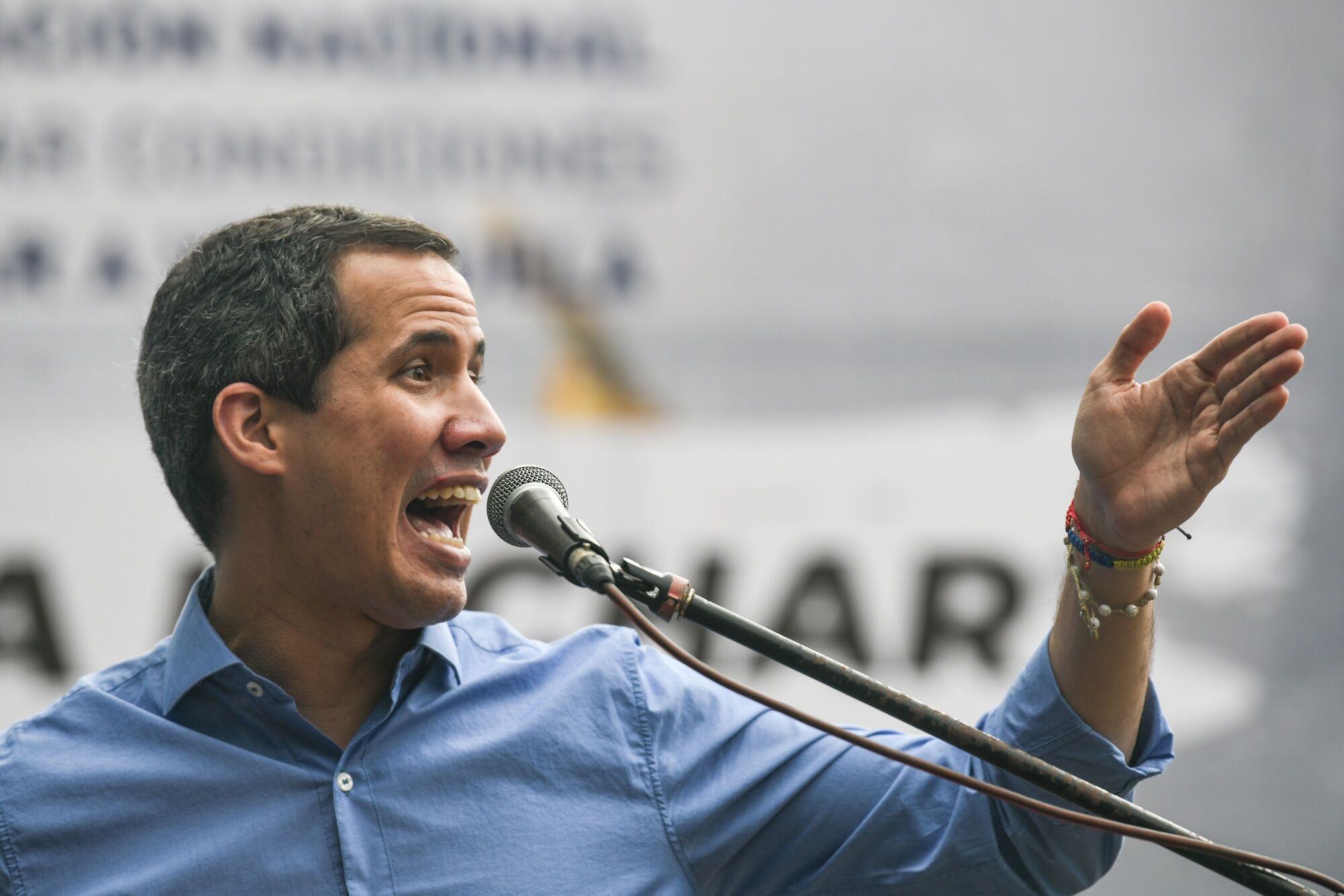Guaido’s Reign in Danger as Venezuelan Opposition Moves to Ditch Him
By , , and- Three top parties against extending his mandate past January
- Disarray strengthens Maduro’s hand for November elections
Three years after Venezuela’s fractured opposition united around Juan Guaido with strong U.S. backing, several of those same political parties are ready to defy Washington and ditch him as the face of their movement.
A group of governments, led by the U.S., is pressing the parties to extend Guaido’s mandate as National Assembly president and head of the opposition’s interim government after it expires in January, according to eight people with direct knowledge of the situation. Three of the four principal opposition parties oppose the idea and even some members of Guaido’s own Popular Will party haven’t signed on, according to the people.
“There is an attempt to continue extending the Guaido government, but that does not help the Venezuelan people, and I’m not going to support it,” said Henrique Capriles, a former presidential candidate from the Justice First party whose support for Guaido, which was key in 2019, has cooled as the interim government has stumbled recently.
The dissent stems from the Guaido government’s failure to oust President Nicolas Maduro and discrepancies over handling of assets abroad, the people said. The split appears likely to strengthen Maduro’s hand ahead of a Nov. 21 election for mayors and governors, the first in three years in which the opposition plans to participate. It has yet to unify around candidates in the few races where it has a chance, and the dispute over Guaido is adding to the disarray.
It also comes after Maduro pulled out of negotiations with the opposition last month in Mexico, a result he said of the U.S.’s extradition of a key aide.
Read More: U.S. Requests Maduro Ally Be Held Without Bail in Graft Case
Representatives for Guaido declined to comment. In a recent tweet, Guaido said support from U.S. representatives such as Senator Dick Durbin is key in the fight to “defeat the tragedy that the dictatorship represents.”
Parties Split
Justice First party leader Julio Borges, who has served as a foreign relations delegate and ambassador to the United Nations under Guaido, opposes extending his mandate, as do leaders from the New Era and Democratic Action parties, the people said. A coalition of more than two dozen small political parties -- which controls a minority voting bloc in the assembly -- plans to back Guaido, according to one of the people. The assembly already voted once to extend Guaido’s mandate, but it is unclear if they will attempt a similar vote before the January deadline.
When Guaido, then 35 years old, thrust himself upon the scene nearly three years ago, it was as a constitutional alternative to Maduro, widely seen as having won a rigged re-election. Many Venezuelans embraced the hope that the combination of opposition unity, international backing and U.S. sanctions would drive Maduro out and create the conditions for new elections. Arguing that Maduro’s presidency had no legal basis, Guaido set up a shadow government, including parallel diplomatic missions.
But Maduro held firm and Guaido’s standing has dwindled in a once-rich nation slowly unraveling. Many of those seeking a post-Maduro Venezuela are now looking to regroup and focus on winning a presidential elections in 2024. They call for getting the government back to the negotiating table, the people said.
U.S. officials, led by Ambassador James “Jimmy” Story, have held meetings with two key opposition leaders: Borges and Leopoldo Lopez, an exiled politician who is the founder and leader of Guaido’s party and one of the forces behind the plan to extend the mandate, the people said.
Read More: Blinken Calls Venezuela Move to Leave Mexico Talks ‘Unfortunate’
The State Department does not comment on the content or existence of private diplomatic conversations, a spokesperson said in an email response to questions.
“The United States continues to recognize the authority of the democratically elected 2015 National Assembly as the last remaining democratic institution and of Juan Guaido as Venezuela’s interim president,” the spokesperson wrote.
Neither Borges or Lopez responded to messages seeking comment.
Although Guaido has virtually no political authority in the country, his recognition as interim leader by other governments has given him control over billions of dollars of assets Venezuela owns in those countries, including the parent company of oil refiner and gas distributor Citgo Holding Inc.
Read More: Creditors Close in on Citgo, the Last Asset Guaido Has Left
The question now is what happens once the assembly’s mandate -- which gives Guaido his claim to power -- expires in January. If Guaido has no mandate at home, his control over state-oil company PDVSA and central bank assets abroad may fall into a void.
Some of his supporters say that sticking with Guaido is vital because it is fundamentally about keeping attention focused on the unlawful nature of Maduro’s government, not whether everyone loves Guaido.
“He should continue until free elections take place, since this is at the basis of the argument calling Maduro an illegitimate leader by the international community,” said Jose Ignacio Hernandez, Guaido’s former prosecutor general. “Those who oppose him would be violating the constitution. The U.S., U.K., E.U. have called for free presidential elections.”













Keine Kommentare:
Kommentar veröffentlichen